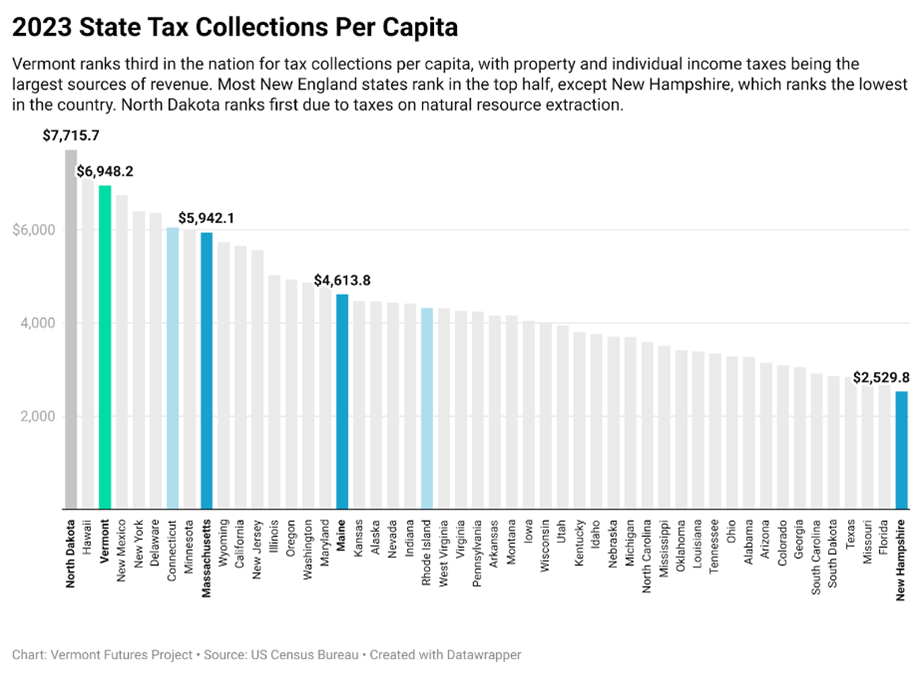26 Ways Legislative and Executive Action or Inaction Could Impact Businesses After the 2025 Session
The 2025 legislative session delivered a mix of progress, pause, and uncertainty for Vermont employers. Lawmakers advanced proposals to support workforce development, housing, and infrastructure—but also continued a pattern of high spending, new mandates, and regulatory burdens.
Key decisions this year—from to-go cocktails to major education and tax reforms—will shape Vermont’s business climate for years to come. Below is a snapshot of 26 developments, delays, and decisions from the session that employers should know.
🪙$ 3 Billion in cost increases over the last five years as the state budget has ballooned from $5.8 billion to $9.1 billion in spending. This year-over-year increase is a troubling pattern for an affordable future.
🚛Costly EV truck and car regulations under the Clean Car and Clean Truck Acts were paused by Governor Scott, recognizing the lack of available EV infrastructure and affordable all-electric vehicle options for businesses and consumers.
🤝The Small Business Development Center received an additional $150,000 in state funding to provide expert advising to businesses across the state.
🍹A pandemic innovation, to-go cocktails will be a permanent program allowing restaurants to offer drinks to-go with takeout food orders.
🧪Chemicals used in manufacturing will receive additional regulatory oversight or a full ban with a timeline for implementation phased in over the next few years.
👩⚕️Small businesses will not have to shoulder the added weight of subsidizing premiums for the individual healthcare market. The individual and small group markets have been permanently separated.
🫂Unpaid Leave Expansion starts July 1, creating an expanded, more inclusive definition of family, and adding other types of leave, including bereavement and safe leave.
👩🏽🎓Advance Vermont received $150,000 in funding to continue building out Vermont’s premier online hub for career and education exploration and planning.
🧑🏽🍳Non-stick cookware ban has been pushed back to 2028 to allow more time for alternative products to be widely available for consumers and restaurants.
💵Property taxes were bought down with $77 million in one-time funds to keep this year’s increase at an average of 1%. It is not clear yet how that bill will be paid next year.
🪖Military Retiree Pensions will be exempt from taxation at $125,000 of income and scaled down to $175,000 of income, making Vermont a more desirable destination for retirees in search of a second career.
💦Stormwater Management reforms extend deadlines for business to comply with three-acre impervious surface permits, with varying dates depending on the watershed.
🏠Available Housing remains elusive for middle-income Vermonters, but some relief will be felt with $15 million of funding in the budget for the Missing Middle-Income Homeownership Development Program and the Renter Revolving Loan Fund.
🍀Irish Trade could be in focus with a newly created Irish Trade Commission aimed at opening new markets between Vermont and the Emerald Isle.
💻Data Privacy legislation that balanced consumer protections with business access to digital marketing tools passed the Senate unanimously before being inexplicably sidelined in the House. The bill is expected to be taken up again next year. For now, Vermont businesses remain unregulated, and Vermonters have no legal data privacy protections.
🌲Rural infrastructure capacity got a major boost with the creation of a new tax increment financing tool, which can be used by small and large communities to build infrastructure that will support housing.
🏫Education Reform crossed its major hurdle with a sweeping reform bill aimed at revamping the entire system’s financial and governance structures in an effort to control costs and refocus the education system on students.
💰Proposed Business Only Property Tax Classification, which meant to treat businesses as a valve to stabilize other taxpayers, was removed from the education reform bill after advocacy from the business community and the Governor. This demonstrated the power of coordinated business advocacy.
🏘️Infrastructure Sustainability Fund was created and funded with $7.5 million in the Vermont Bond Bank to expand infrastructure development financing opportunities across Vermont.
❤️🩹Healthcare Premiums are expected to see a fourth year of unsustainable increases, but with a new law which will limit the markup of certain prescription drugs, those increases will be 4% lower than originally projected.
🤖UVM Tech Hub will leverage $750,000 in newly appropriated state funds, with additional private investment, to fuel business growth and rural workforce development across the state.
👷🏽♀️Employer Mandates were largely tabled this year after critical testimony on the various proposals put forward. Increasing minimum wage to $25 an hour, implementing a fine for not providing enough employee seating, removing at-will employment, and mandating temperature related benefits are just a few of the proposals that businesses will not need to implement this year. However, they may re-emerge next year for consideration.
🍁Montreal Business Development Office will continue to operate, encouraging Canadian businesses to consider expansion opportunities in Vermont with an investment of $150,000 for the next year.
🏢Convention Center Feasibility will be studied over the summer by interested parties to understand what is involved in bringing larger conventions, and the dollars that follow, to the Green Mountain State.
🧹Brownfield remediation projects will get another $1 million in funding for the assessment, remediation, and redevelopment of sites.
💸Clean Heat Standard was neither implemented nor repealed. As a result, this high expense program will not move forward this year, though further legislative action is needed with the Global Warming Solutions Act lawsuits still looming.




